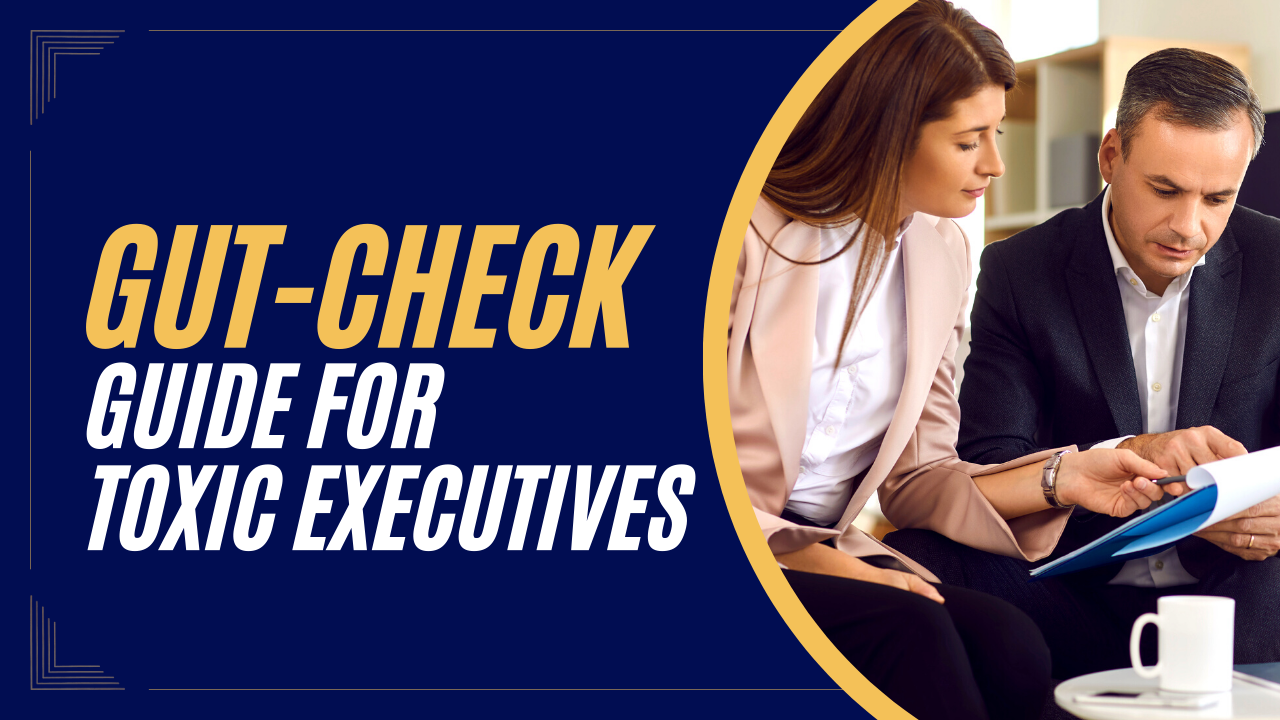
Have you ever had that feeling when you've hired someone who seemed perfect on paper and aced the interviews, but things don't add up when they're on board? You're not alone. Many executives have faced this hiring nightmare. What's worse is when these seemingly ideal candidates transform into something entirely different from what you expected. In this article, we're offering a gut-check guide for executives to assess and tackle the challenge of dealing with a bad hire or a toxic executive. When you find yourself in these situations, it's crucial to prioritize your organization's well-being over any one individual.
The Impact of Executives on Workplace Culture
The Harvard Business Review reveals that senior executives wield significant power in shaping the work environment. They can create a nurturing space where employees thrive, or they can foster a toxic atmosphere where everyone is miserable. Surprisingly, these executives' mental health and psychological state play a pivotal role in how they use their newfound power. A stable and well-balanced executive usually builds a company where rules make sense, allowing employees to focus on their jobs. However, when an executive's mental state goes awry, it can manifest in various ways, affecting the organization's plans, ideas, interactions, and structure. While we can't psychoanalyze candidates during the hiring process, it becomes crucial to take action when these issues surface within executives. Here are five compelling reasons why addressing toxic executives sooner rather than later is vital:
Trust Your Gut: Morale Equals Productivity
You might not have concrete numbers to prove it, but deep down, you know there's a connection between employee morale and productivity. A happy and engaged workforce tends to outperform an unhappy one that's mentally checked out. When external market challenges are already knocking at the door, a toxic executive can make matters worse by dragging down morale and sapping productivity.
Recognize the Signs: Top Performers Disengage
Studies indicate that around 70% of management employees become disengaged in the average organization. The remaining 30% are the true heroes who drive results, close deals, meet production targets, and tackle challenges head-on. When these top performers start disengaging because of a toxic executive, your organization is in jeopardy. Critical problems may go unnoticed, growing into massive issues that demand immediate attention.
Act Before It's Too Late: Top Talent Flees
Under the leadership of toxic executives, valuable employees face a tough decision – endure a poisonous environment or seek greener pastures. In today's mobile workforce, top talent has plenty of options, perhaps even offers they turned down in the past. A toxic workplace makes it tempting for them to reconsider these opportunities and jump ship.
Navigate the Haze: Difficulty in Evaluating Past Behavior
Hiring professionals struggle to understand a candidate's past due to legal and corporate policies that limit what former employers can disclose during employment verifications. This reality can lead you to be swayed by a powerful resume that doesn't align with reality. Most job interviews are surface-level, often missing crucial insights into a candidate's past relationships with subordinates.
Trust Your Instincts: Recognizing Narcissism and Pathological Behavior
One of the most common forms of executive toxicity is narcissism. We all have some narcissistic tendencies, but it becomes problematic when they run amok. Spotting a toxic level of narcissism can be crucial. Look for clues like a black-and-white mindset, where it's their way or no way at all, a reluctance to consider input from subordinates when making decisions, and the division of coworkers into those "in the circle" and those "out of the circle of trust." Toxic executives often see themselves as infallible "Messiahs" who prioritize appearances over practical problem-solving. This tendency becomes more apparent when they respond to challenging situations by worrying about how they will reflect on themselves rather than finding solutions.
Trust Your Gut and Act
In reality, we're all more alike than we care to admit, and toxic executives are often an extreme version of our challenges, magnified by their power. When you suspect you have a problematic employee on your team, you're likely onto something. Relying on your instincts is essential, but it's equally important to conduct thorough due diligence when dealing with a toxic executive.
When handled correctly, the rewards are immediate – it feels like a weight lifted off your shoulders, and the clouds part to reveal the sun shining brightly again. Toxic employees can spread like a disease, and if not dealt with promptly, they can metastasize and cripple your organization. The most challenging part of effective leadership is making tough decisions based on incomplete information. If your gut tells you it's time to part ways with a toxic executive, trust your instincts. Letting them take their toxicity elsewhere is better than continuing to harm your organization. Prioritize your organization's well-being and take decisive action when needed.